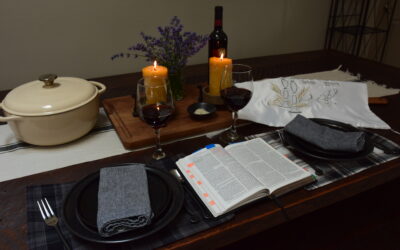Language is enigmatic.
But then, so are the lives it attempts to express and the people who use it to do so.
Giving and taking are direct opposites. So, logically speaking, a caregiver gives care and a caretaker . . . takes care away? Sort of. The critical difference in this case rests with whom we are serving. As the caregiver to someone, he or she is the direct recipient of our efforts; as a caretaker for someone, the recipient is actually the one from whom we have accepted the duties of caring–the one from whom we have taken the responsibility of care.
Oxford Languages differentiates between the two in this way: A caregiver is “a family member or paid helper who regularly looks after a child or a sick, elderly, or disabled person,” while a caretaker is “a person employed to look after a building, holding temporary power, employed to look after animals or people.” We give care to someone; we take care for someone. Both, however daunting, are an honor and a privilege.
So who cares?
Well, word nerds like me. Word nerds who suddenly find themselves defined by the very words in question and so naturally feel inclined to clarify the meaning, so it’s best to start at the beginning.
Way back in Genesis, God uses the word shomer when He assigns man his earthly duties.
“And Hashem Elohim took the adam and put him in the Gan Eden la’avod (to till, to work) it and to be shomer over it.”
Genesis 2:15 (Orthodox Jewish Bible)
In Hebrew–the language in which most of the Old Testament was originally written–the verb shamar means “‘to exercise great care over.’ In the context of Genesis 2:15, it expresses God’s wish that mankind, in the person of Adam, ‘take care of,’ ‘guard,’ or ‘watch over’ the garden. A caretaker maintains and protects his charge so that he can return it to its owner in as good or better condition than when he received it” (Blue Letter Bible Lexicon). In fact, according to John Parsons of Hebrew for Christians, the verb shamar shows up over 400 times in the Tanakh–the Hebrew Bible.
Anyway, Adam didn’t do such a bang-up job as caregiver or caretaker, and so here we are, centuries later, faced with the curse of sweat and toil, pain in labor for men and women, and death, all in the service of caregiving and caretaking. It seems like these are pretty important concepts to God. We didn’t get it right the first time, so He made it even harder to do and impossible to avoid. So have a care: It’s a big responsibility, an honor beyond what we deserve.
Shamar is a central theme in Psalm 121, as David reflects upon God’s care of us.
“(Shir HaMa’alot) I will lift up mine eyes unto the harim (hills), from whence cometh ezri (my help).
I lift up my eyes to the hills.
From where does my help come?Ezri (my help) cometh from Hashem, Oseh Shomayim v’Aretz.
My help comes from the Lord,
who made heaven and earth.He will not allow thy regel to slip; He that is shomer over thee will not slumber.
He will not let your foot be moved;
he who keeps you will not slumber.Hinei, He that is shomer over Yisroel shall neither slumber nor sleep.
Behold, he who keeps Israel
will neither slumber nor sleep.Hashem is the One shomer over thee; Hashem is thy shade upon thy right hand.
The Lord is your keeper;
the Lord is your shade on your right hand.The shemesh shall not strike thee by day, nor the yarei’ach by night.
The sun shall not strike you by day,
nor the moon by night.Hashem shall preserve thee from kol rah; He shall preserve thy nefesh.
The Lord will keep you from all evil;
he will keep your life.Hashem shall be shomer over thy going out and thy coming in from this time forth, and even v’ad olam.
The Lord will keep
Psalm 121 (Orthodox Jewish Bible/ESV)
your going out and your coming in
from this time forth and forevermore.”
We strive to give care to each other, our animals, our land and our world–our stuff–taking care, for God, of all we’ve been given until Jesus returns and we hand it all back to the true owner and originator. We are here to understand what it is to truly give and take care, as God perfectly gives and takes care.
At this stage of my life, I am learning the true meaning of next-level care. In a typical marriage, each partner is caregiver and caretaker, in sickness and in health; however, ALS slowly reshapes and ultimately steels marital reciprocity. It changes how we give care to one another and it alters how we take care of all the things that have been entrusted to us. One partner must eventually assume all the previously shared cares.
For instance, this past year I have learned (among other caretaker tasks) to rewire all the electrical outlets and switches in the house and to replace the element in the hot water heater. I now install curtain rods and light fixtures, towel bars, faucets, and shelving units. I am, physically speaking, the strongest person in the house. And that’s not saying much.
I have no idea why God has Stan here, in this strange in-between world of can’t-quite-do-the-thing and can’t-quite-not-do-the-thing, but people say it’s going to get worse, that I’ll be doing much more caregiving and caretaking and he will be doing less and less. It used to terrify both of us, but over the years God has carefully prepared us for our respective duties and roles, faithfully showing us the way. It is through the marriage covenant that we have the opportunity to truly learn how to give and take care as God intended, as God does.
“Everyone to whom much was given, of him much will be required, and from him to whom they entrusted much, they will demand the more.”
Luke 12:48
I have been given so, so much. I pray I am able to return to the Lord all that He demands.




0 Comments